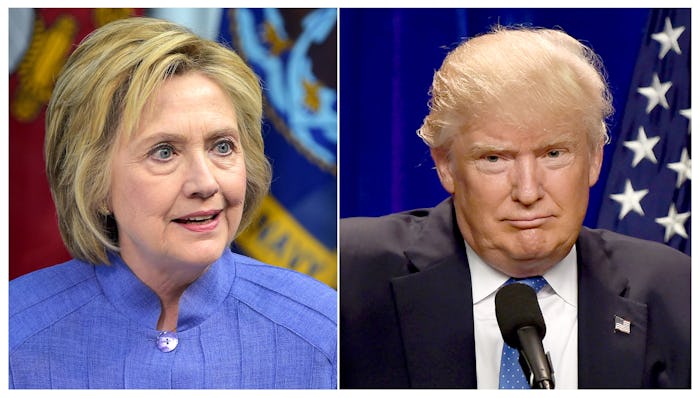News

Who Decides Which Candidates Are In The Debates? CPD's Criteria Determines Who Speaks
With the first presidential debate just around the corner, voters may be curious about some of the ins and outs of the selection criteria for who makes it on stage. For example, who decides which candidates are in the debate? The Commission on Presidential Debates (CPD) narrowed down this election’s contenders to Democratic nominee Hillary Clinton and Republican nominee Donald Trump. At 9 p.m. on Monday, Sept. 26, the two candidates will debate for 90 minutes about three topics: America's Direction, Achieving Prosperity, and Securing America.
The CPD — the organization in charge of the presidential debates — decides who will be behind a podium based on a candidate’s polling numbers. Specifically, candidates must have a 15 percent or higher polling average in at least five national polls, which will all be averaged together to determine eligibility.
According to the commission:
Under the 2016 Criteria, in addition to being Constitutionally eligible, candidates must appear on a sufficient number of state ballots to have a mathematical chance of winning a majority vote in the Electoral College, and have a level of support of at least 15 percent of the national electorate as determined by five selected national public opinion polling organizations, using the average of those organizations’ most recently publicly-reported results at the time of the determination.
According to CNN, the polls that are factored into the selection process include ABC-Washington Post, CBS-New York Times, CNN-Opinion Research Corporation, Fox News, and NBC-Wall Street Journal. The commission said these polls were chosen with "professional advice" from Frank Newport, the editor in chief of Gallup, a company known respected for its public opinion polls.
The criteria was announced in October 2015, which said would be applied in mid-September. The commission announced on Monday that Trump and Clinton, along with their running mates, would be taking the stage next week. But, third-party candidates Gary Johnson and Jill Stein were not invited, as their polling averages did not make the cut.
The commission said in a statement, according to Fortune, that Clinton's polling averages were the highest at 43 percent, Trump's were 40.4 percent, Johnson's were 8.4 percent, and Stein's were the lowest at 3.2 percent.
"If a candidate is invited to the first presidential debate, that person's vice presidential running mate will be invited to the vice presidential debate," the commission said, according to CNN. "The criteria will be reapplied between the first and second presidential debates and the second and third presidential debates."
The first debate will be hosted by NBC's Nightly News anchor Lester Holt, who also chose the topics that will be discussed. The topics could change, depending on news developments leading up to the debate.
While this election has already been whirlwind of political craziness, there's hope that this much-anticipated televised meeting will answer many of the questions American voters want to know. But, really, it's anyone's guess what will happen or be said when the two candidates come face to face on Sept. 26.